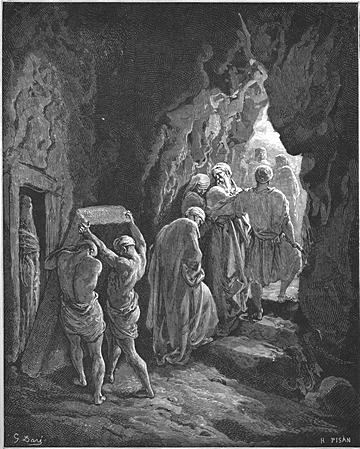Petri I 3
1 similiter mulieres subditae suis viris ut et si qui non credunt verbo per mulierum conversationem sine verbo lucri fiant
LIKEWISE, ye wives, be in subjection to your own husbands; that, even if some obey not the word, by their wives’ conduct without the word, they may be won over;
2 considerantes in timore castam conversationem vestram
being eye-witnesses of your chaste behaviour with timidity.
3 quarum sit non extrinsecus capillaturae aut circumdatio auri aut indumenti vestimentorum cultus
Whose adorning let it not be that exterior one of braided locks, and golden trimmings, and dresses put on with nicety;
4 sed qui absconditus cordis est homo in incorruptibilitate quieti et modesti spiritus quod est in conspectu Dei locuples
but let it be the hidden man of the heart, with that incorruptible ornament of a gentle and quiet spirit, which is in the sight of God highly valuable.
5 sic enim aliquando et sanctae mulieres sperantes in Deo ornabant se subiectae propriis viris
For so in times of old the holy women also, who hoped in God, adorned themselves, being in subjection to their own husbands;
6 sicut Sarra oboediebat Abrahae dominum eum vocans cuius estis filiae benefacientes et non timentes ullam perturbationem
as Sarah obeyed Abraham, calling him lord: whose children ye are, if ye do well, and are not affrighted with any terror.
7 viri similiter cohabitantes secundum scientiam quasi infirmiori vaso muliebri inpertientes honorem tamquam et coheredibus gratiae vitae uti ne inpediantur orationes vestrae
Ye husbands, in like manner dwell with them discreetly, putting respect on the dear woman as being the weaker vessel, and as co-heirs of the grace of life, so that your prayers may meet no interruption.
8 in fine autem omnes unianimes conpatientes fraternitatis amatores misericordes humiles
Finally, be all like-minded, sympathizing, loving fraternally, compassionate, friendly hearted,
9 non reddentes malum pro malo vel maledictum pro maledicto sed e contrario benedicentes quia in hoc vocati estis ut benedictionem hereditate possideatis
not returning evil for evil, or railing for railing; but, contrariwise, wishing men every blessing; knowing that hereunto ye have been called, that ye should inherit the divine benediction.
10 qui enim vult vitam diligere et videre dies bonos coerceat linguam suam a malo et labia eius ne loquantur dolum
“For he that would love life, and see good days, let him restrain his tongue from evil, and his lips from speaking guile.
11 declinet autem a malo et faciat bonum inquirat pacem et persequatur eam
Let him depart from every wicked thing, and do good; let him seek peace, and pursue it.”
12 quia oculi Domini super iustos et aures eius in preces eorum vultus autem Domini super facientes mala
For the eyes of the Lord are upon the just, and his ears open to their prayers: but the face of the Lord is against those who practise wicked things.
13 et quis est qui vobis noceat si boni aemulatores fueritis
And who will do you harm if ye be imitators of him that is good?
14 sed et si quid patimini propter iustitiam beati timorem autem eorum ne timueritis et non conturbemini
But if ye should even suffer for righteousness, blessed are ye: be not afraid of their terror, neither be troubled,
15 Dominum autem Christum sanctificate in cordibus vestris parati semper ad satisfactionem omni poscenti vos rationem de ea quae in vobis est spe
but sanctify the Lord God in your hearts: and be always ready with your reply to every man who demands a reason respecting the hope which is in you with meekness and fear:
16 sed cum modestia et timore conscientiam habentes bonam ut in eo quod detrahunt vobis confundantur qui calumniantur vestram bonam in Christo conversationem
keeping a good conscience; that whereas they malign you, as evil doers, they may be confounded who take pleasure in ridiculing your good conduct in Christ.
17 melius est enim benefacientes si velit voluntas Dei pati quam malefacientes
For it is better (if it be God’s will) to suffer as well doers than as evil doers.
18 quia et Christus semel pro peccatis mortuus est iustus pro iniustis ut nos offerret Deo mortificatus carne vivificatus autem spiritu
For Christ also suffered once for sins, the just for the unjust, that he might bring us to God, put to death indeed in the flesh, but raised to life by the Spirit:
19 in quo et his qui in carcere erant spiritibus veniens praedicavit
by which also he went and preached to those spirits imprisoned;
20 qui increduli fuerant aliquando quando expectabat Dei patientia in diebus Noe cum fabricaretur arca in qua pauci id est octo animae salvae factae sunt per aquam
who in time of old were disobedient, when the long suffering of God in the days of Noe waited, while the ark was preparing, in which a few, that is, eight persons, were preserved through the water.
21 quod et vos nunc similis formae salvos facit baptisma non carnis depositio sordium sed conscientiae bonae interrogatio in Deum per resurrectionem Iesu Christi
The antitype to which baptism now saveth us (not the mere removal of filth from the flesh, but the engagement of a good conscience to God), by the resurrection of Jesus Christ:
22 qui est in dextera Dei profectus in caelum subiectis sibi angelis et potestatibus et virtutibus
who is at the right hand of God, gone into heaven, angels and dominations and powers being put in subjection under him.





















